
A Quiet Benediction of Eternal Love, Whispered on the Wings of Time
Upon its release in 1979, Dan Fogelberg’s “Longer” emerged not with bombast but with the quiet dignity of a hymn, ascending to No. 2 on the Billboard Hot 100 in early 1980 and securing its place as one of his most enduring ballads. Nestled within the tender folds of his seventh studio album, Phoenix, the song diverged from the album’s broader themes of transformation and personal reckoning to offer something more distilled, more universal: a declaration of love so pure, so unadorned, that it transcended trends and landed gently in the hearts of millions.
“Longer” was penned during a serene moment of inspiration while Fogelberg vacationed in Maui—an environment whose tranquility echoes throughout the song’s ethereal arrangement. The setting is fitting; there’s something unmistakably oceanic about the piece—its rhythm like a gentle tide, its words as timeless as driftwood polished by waves. Composed around a solo acoustic guitar accompanied by a hauntingly delicate flugelhorn played by Jerry Hey, the song eschews ornate production in favor of stark intimacy. This sparseness is not emptiness—it is reverence.
Lyrically, “Longer” functions less as a narrative and more as an incantation. Fogelberg crafts verse after verse of comparisons that evoke natural permanence—“Longer than there’ve been fishes in the ocean,” “Higher than any bird ever flew”—each line building upon the last like strata in ancient rock, testifying to love’s immutability. It’s a litany of metaphors that risks saccharine excess but never succumbs to it; instead, it achieves a rare sincerity through its very simplicity. These are not just poetic flourishes—they are invocations drawn from the deepest wells of devotion.
To understand “Longer” is to understand Fogelberg himself: an artist unafraid to be earnest in an era increasingly skeptical of sincerity. At a time when post-disco gloss and punk grit competed for cultural dominance, this song stood apart—a quiet testament to emotional clarity. Its success wasn’t owed to fashion but to feeling; it touched those who heard it not through novelty but through resonance.
In retrospect, “Longer” feels less like a hit single and more like a vow whispered between lovers when the world has gone quiet. It endures because it speaks to the ineffable—the ways we measure love not in years or deeds but in moments that outlast us. And in that stillness, with only strings and breath and voice, Fogelberg gave us something sacred: not just a song about love, but a love song that feels eternal.